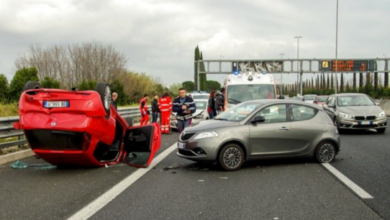Left-Turn Accidents: Causes, Legal Consequences, and Damages


Left-turn accidents are a common occurrence in the US, often resulting in severe injuries and significant property damage. These collisions typically occur when a driver attempts to turn left without yielding to oncoming traffic or pedestrians. Left-turn accidents can be hazardous because they often involve high speeds and limited reaction time for those involved.
Taking the proper steps after a left-turn accident is crucial to protecting your rights and ensuring adequate compensation. The legal process following such accidents can be complex, and understanding the potential causes, legal consequences, and types of damages involved is critical.
This article will explore the common causes of left-turn accidents, the legal implications for those involved, and the damages you may be entitled to.
Common Causes of Left-Turn Accidents
Left-turn accidents often happen due to several factors that compromise the safety of drivers, pedestrians, and passengers. Recognizing these causes can help you understand how to avoid such collisions or, if you’re involved in one, how to determine liability.
Here are some of the most common causes of left-turn accidents:
Failure to Yield to Oncoming Traffic
One of the most common causes of left-turn accidents is when a driver makes a left turn without properly yielding to oncoming vehicles. In many cases, the driver assumes they have enough time to turn but misjudges the speed or distance of approaching traffic. This can result in a crash as the turning vehicle is struck by an oncoming car.
Impaired or Distracted Driving
Drivers who are drunk or on drugs or those distracted by mobile devices are more likely to cause left-turn accidents. Impaired drivers may not fully assess their surroundings or react quickly enough when turning left.
Distractions such as texting, talking, or looking at the GPS can lead to missed cues from other vehicles or pedestrians, increasing the risk of an accident.
Poor Road Conditions or Visibility
Adverse weather, like rain or fog, can impair a driver’s visibility when turning left. Poorly lit intersections or those without proper signage can also contribute to accidents, as drivers may fail to notice other vehicles or traffic signals. Road conditions, like potholes or debris, can cause a car to lose control during a turn.
Failure to Signal
Not using turn signals is another cause of left-turn accidents. When drivers don’t signal their intentions, other vehicles cannot anticipate the turn. This lack of communication can result in a crash when another vehicle doesn’t realize a turn is being made and collides with the turning car.
Inexperienced or Unqualified Drivers
Inexperienced drivers or those who haven’t fully grasped traffic rules might make poor judgments when turning left. They may miscalculate the speed of oncoming traffic or fail to observe pedestrians in crosswalks, leading to accidents.
Legal Consequences After a Left-Turn Accident
If you’re involved in a left-turn accident, there are legal consequences to consider, especially when determining who is at fault.
In most cases, the driver making the left turn is responsible for the collision if they fail to yield or act negligently.
However, liability isn’t always straightforward, and factors such as the other driver’s behavior, road conditions, and even traffic signals may play a role.
Fault and Liability
In the event of a left-turn accident, law enforcement and insurance companies will investigate the scene to determine fault.
If you were making the left turn and failed to yield to oncoming traffic, you are typically liable for the accident. However, you may share the fault if the other driver was speeding, distracted, or violated traffic laws. The legal system often uses comparative negligence to assess the degree of responsibility each party bears.
Insurance Claims
After a left-turn accident, filing an insurance claim is usually one of the first steps. Your insurance provider will assess the crash details to determine who is responsible and how much compensation you may have the right to for damages and injuries. If another driver is at fault, you may be able to file a claim through their insurance, or you may need to pursue legal action if the claim is denied.
Potential Lawsuits
If the insurance claim doesn’t cover all of your medical expenditures, lost wages, or other damages, you may need to pursue a personal injury lawsuit. In this case, your attorney will help gather evidence, like witness statements, traffic camera footage, and expert testimony, to build a case for your compensation.
Penalties for the At-Fault Driver
In some cases, if the at-fault driver was impaired, distracted, or acting recklessly, they may face criminal charges. This can include fines, license suspension, or even jail time, based on the severity of the accident and the laws in your jurisdiction.
Damages You Could Be Entitled to After a Left-Turn Accident
You may be entitled to damages if you’re injured in a left-turn accident. These damages can vary depending on the level of your injuries, damage to your vehicle, and the circumstances surrounding the crash.
Here are the types of damages you may be entitled to:
Medical Expenses: You can seek settlement for any medical expenses accrued due to the accident, including hospital bills, surgeries, physical therapy, and ongoing medical care. This also covers the cost of prescription medications and any necessary medical equipment.
Lost Wages: If you’re unable to work because of your injuries, you can claim payment for lost wages. This can include past wages and any future loss of the ability to work if the accident leads to long-term disability.
Pain and Suffering: In some cases, you may be able to reclaim damages for physical pain and emotional suffering caused by the accident. This consists of both the physical pain of your injuries and the emotional distress from the trauma.
Property Damage: You can also seek compensation for the damage to your vehicle or personal property because of the accident. This typically includes the cost of repairs or the car’s value if it was totaled.
Punitive Damages: You may be granted punitive damages in cases of gross negligence or extreme misconduct (such as drunk driving). These are meant to hold the at-fault driver accountable and prevent similar behavior in the future.
Conclusion
Left-turn accidents can cause serious injuries, vehicle damage, and legal complications. Knowing the common causes of these accidents and how to respond can help you avoid such incidents or protect your rights if you’re involved in one.


